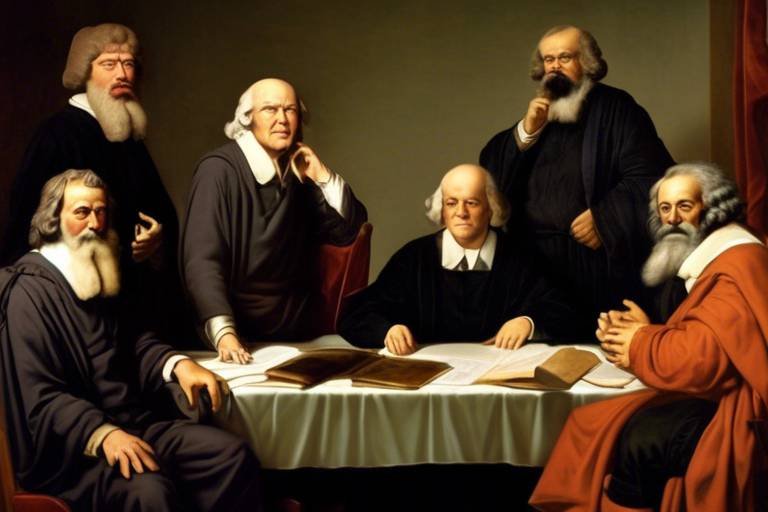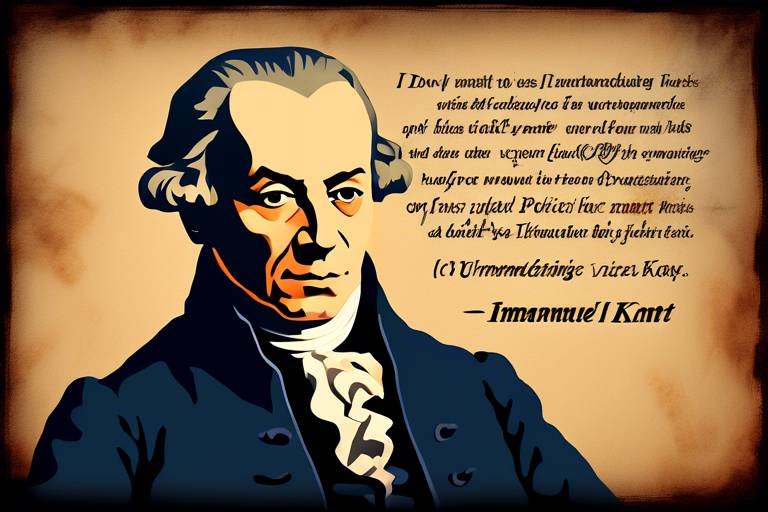Do Philosophers Make Good Politicians?
When we think about the qualities that make a great politician, we often picture someone who is charismatic, persuasive, and adept at navigating the murky waters of public opinion. But what if we looked at the world of politics through the lens of philosophy? Do philosophers possess the unique skills and mindset necessary for effective political leadership? This question invites us to explore the intersection of philosophy and politics, examining whether the analytical and ethical training of philosophers equips them to tackle the complex challenges of governance.
Philosophers are not just thinkers; they are critical analysts and problem solvers. Their training encourages them to dissect arguments, question assumptions, and approach issues from multiple angles. This philosophical mindset can be invaluable in politics, where decisions often have far-reaching consequences. Imagine a politician who can sift through the noise of public debate, identify core issues, and craft policies that address them directly. Such a skill set is precisely what philosophical training cultivates.
Moreover, philosophers are well-versed in ethics, grappling with dilemmas that require a nuanced understanding of right and wrong. In the political arena, this ethical grounding can lead to more principled actions. Politicians who are familiar with concepts like utilitarianism—which advocates for the greatest good for the greatest number—may be better equipped to make decisions that benefit society as a whole. However, the challenge lies in translating these ethical theories into practical policies.
Consider the following challenges that philosophers face in political contexts:
- Conflicting Interests: In a diverse society, what is good for one group may not be good for another.
- Unintended Consequences: Policies that seem beneficial on paper can lead to unforeseen negative outcomes.
- Public Opinion: Philosophical ideals may clash with the immediate desires of constituents.
Real-world examples of philosophers in politics reveal both the potential and pitfalls of applying philosophical principles. For instance, historical figures like John Stuart Mill advocated for utilitarian approaches in governance, yet faced backlash when their policies did not yield the expected results. These instances illustrate that while philosophical frameworks can guide decision-making, the complexities of human society often complicate their implementation.
In addition to utilitarianism, another significant ethical framework is virtue ethics, which emphasizes the importance of character and moral virtues. Politicians grounded in virtue ethics may prioritize integrity, wisdom, and courage, fostering trust among constituents. A leader who embodies these qualities can inspire loyalty and respect, essential elements for effective governance.
As we delve deeper into the historical context, we uncover numerous instances of philosopher-politicians who have shaped political landscapes. Figures like Plato and Machiavelli have left indelible marks on political theory and practice, offering insights into the potential benefits and drawbacks of philosophical involvement in politics. Their contributions encourage us to reflect on the lessons learned from their successes and failures, shaping contemporary discussions on leadership.
Ultimately, the question remains: Can philosophers truly make good politicians? The answer is complex and multifaceted. While their critical thinking and ethical grounding provide them with unique advantages, the unpredictable nature of politics often tests even the most well-intentioned philosopher. However, as we analyze the relationship between philosophical thought and political effectiveness, it becomes clear that the dialogue between these two fields is not only necessary but essential for the evolution of governance.
- What qualities do philosophers bring to politics? Philosophers bring critical thinking, ethical reasoning, and a deep understanding of societal issues to the political arena.
- Can philosophical theories be applied in real-world politics? While philosophical theories provide valuable frameworks, their application often faces challenges due to conflicting interests and unintended consequences.
- Are there historical examples of philosopher-politicians? Yes, figures like Plato and Machiavelli have significantly influenced political thought and practice throughout history.

The Philosophical Mindset
When we think about philosophers, we often picture individuals lost in deep contemplation, pondering the mysteries of existence, ethics, and the universe. But what if I told you that this philosophical mindset is not just about abstract thinking? It’s a powerful tool that can significantly enhance political decision-making. Philosophers are trained to think critically, analyze complex problems, and develop coherent arguments. This unique skill set enables them to navigate the murky waters of political discourse with a level of clarity that many others may lack.
Imagine a politician faced with a controversial policy decision. Instead of rushing to conclusions based on popular opinion or emotional responses, a philosopher would take a step back, assess the situation from multiple angles, and consider the long-term implications of their choices. This ability to think critically is akin to being a skilled chess player, always anticipating the opponent's next move and strategizing several steps ahead. Philosophers ask the tough questions: What are the underlying principles at play? Who will be affected by this decision? Are there unintended consequences lurking in the shadows?
Moreover, the philosophical mindset fosters a deeper understanding of societal issues. Philosophers delve into the root causes of problems rather than merely addressing the symptoms. For instance, when tackling poverty, a philosopher might explore not just the economic factors, but also the cultural, historical, and ethical dimensions that contribute to the issue. This holistic approach can lead to more effective solutions that resonate with the populace.
Let’s break down some key aspects of the philosophical mindset that can greatly benefit political leadership:
- Critical Thinking: The ability to analyze arguments, identify biases, and evaluate evidence is crucial in politics where misinformation can easily sway public opinion.
- Complex Problem Solving: Philosophers excel at dissecting complicated issues into manageable parts, making it easier to find viable solutions.
- Ethical Consideration: A philosophical background instills a strong sense of ethics, ensuring that decisions are made with integrity and respect for all stakeholders.
In conclusion, the philosophical mindset equips individuals with the tools necessary for effective political leadership. By embracing critical thinking and a comprehensive understanding of societal issues, philosopher-politicians can navigate the complexities of governance with a level of insight that is both refreshing and necessary in today’s political landscape. It’s not just about making decisions; it’s about making the right decisions for the greater good.

Ethics in Politics
When we think about politics, the word ethics often comes to mind. It’s like the invisible thread that weaves through every decision a politician makes. Philosophers, with their deep understanding of moral principles, are particularly adept at navigating the murky waters of political ethics. They dive into the complex dilemmas that often arise in governance, making them uniquely qualified to address these challenges. But what does this really mean for the political landscape? Can philosophers truly make a difference in how we perceive and implement ethical standards in politics?
At its core, ethics in politics isn’t just about following rules; it’s about understanding the values that underpin those rules. Philosophers are trained to dissect these values, weigh competing interests, and come to conclusions that may not always be popular but are rooted in a strong moral framework. This ability to engage with ethical dilemmas can lead to more principled actions in governance. For instance, when faced with decisions that impact the welfare of many, a philosopher might ask: “What is the right thing to do?” rather than “What is the most politically advantageous thing to do?” This distinction is crucial.
Moreover, the intersection of ethics and politics is often illustrated through various ethical theories. For example, utilitarianism—which advocates for actions that maximize happiness—can serve as a guiding principle for policymakers. However, the challenge lies in balancing the greatest good for the greatest number with the rights of individuals. Philosophers can help navigate these waters, ensuring that policies do not trample on minority rights in the pursuit of the greater good. This is where their training in ethical reasoning becomes invaluable.
Additionally, the ethical landscape is not static; it evolves with society's changing values. Philosophers are equipped to recognize these shifts and adapt their ethical frameworks accordingly. They can engage in dialogues about emerging issues such as digital privacy, climate change, and social justice, all of which require a nuanced understanding of ethical implications. By doing so, they can contribute to creating policies that are not only effective but also just and equitable.
However, it’s important to note that the philosophical approach to ethics in politics isn't without its critics. Skeptics argue that while philosophers may have a theoretical understanding of ethics, they might lack the practical experience needed to implement these ideals effectively. This brings us to an essential point: the real-world application of ethical principles can be fraught with challenges. Politicians must contend with competing interests, public opinion, and the often harsh realities of governance. Thus, while philosophical training provides a strong foundation, it must be complemented by practical political experience to be truly effective.
In summary, the role of ethics in politics, particularly through the lens of philosophical thought, is both profound and complex. Philosophers bring a critical mindset and a commitment to moral reasoning that can elevate political discourse. Yet, the translation of these ethical principles into actionable policies requires a careful balance of theoretical knowledge and practical application. As we continue to explore the relationship between ethics and politics, it’s clear that philosophers have much to offer, but they must also navigate the intricate realities of political life.
- What role do philosophers play in politics? Philosophers can offer critical insights into ethical decision-making, helping to shape policies that reflect moral values.
- Can philosophical training help politicians make better decisions? Yes, philosophers are trained to analyze complex problems and consider the ethical implications of their decisions, which can lead to more principled governance.
- What are some challenges philosophers face in politics? Translating ethical theories into practical policies can be difficult due to conflicting interests and the realities of political life.

Utilitarianism and Policy Making
Utilitarianism, a foundational ethical theory, is built on the principle of achieving the greatest good for the greatest number. When applied to policy making, this philosophy encourages decision-makers to prioritize actions that maximize overall happiness and minimize suffering within society. This approach can lead to policies that are not only effective but also equitable. However, translating utilitarian ideals into practical governance is a complex endeavor. Politicians must navigate a web of competing interests, diverse values, and the unpredictable nature of human behavior.
One of the key challenges in implementing utilitarian policies lies in accurately measuring the outcomes of decisions. For example, a policy aimed at improving public health may benefit the majority but could inadvertently harm a minority group. This raises the question: how do we weigh the happiness of the many against the suffering of the few? Philosophers often grapple with these dilemmas, as they must consider not only the immediate effects of a policy but also its long-term implications.
Furthermore, the practical application of utilitarianism can lead to controversial decisions. Politicians may find themselves in situations where they must make trade-offs that appear morally questionable. For instance, a government might decide to allocate resources away from a struggling community to fund a widespread infrastructure project that benefits a larger population. While this decision might align with utilitarian principles, it can also spark significant backlash from those who feel marginalized or neglected.
To illustrate the complexities of utilitarianism in policy making, consider the following table that highlights potential benefits and drawbacks:
| Benefits | Drawbacks |
|---|---|
| Encourages broad consideration of societal impacts | Can lead to neglect of minority rights |
| Promotes policies aimed at maximizing overall welfare | Measurement of happiness and suffering can be subjective |
| Fosters a pragmatic approach to governance | May justify ethically questionable decisions for the sake of the majority |
In summary, while utilitarianism provides a compelling framework for policy making, it is fraught with challenges that require careful consideration. Politicians who embrace this philosophy must be prepared to engage in difficult conversations about the value of individual lives versus the collective good. They must also cultivate a deep understanding of the diverse perspectives within their constituencies to ensure that their policies reflect a balance of interests. Ultimately, the effectiveness of utilitarianism in governance hinges on the ability of leaders to navigate these complexities with empathy and insight.
- What is utilitarianism? Utilitarianism is an ethical theory that suggests actions are right if they promote the greatest happiness for the greatest number of people.
- How can utilitarianism be applied in politics? Politicians can use utilitarian principles to guide policy decisions that aim to maximize societal welfare, weighing the benefits and drawbacks of various options.
- What are the main challenges of utilitarianism in governance? The main challenges include measuring happiness, balancing majority needs with minority rights, and justifying ethically ambiguous decisions.

Challenges of Implementation
When it comes to the implementation of utilitarian principles in political policy, the road is often paved with challenges that can make even the most seasoned philosopher scratch their head in bewilderment. While the theoretical framework of utilitarianism provides a clear and compelling goal—achieving the greatest good for the greatest number—putting this into practice is a different ball game altogether. Imagine trying to bake a cake using a recipe that sounds perfect but requires ingredients that are either unavailable or conflict with your dietary restrictions. This is the kind of dilemma politicians face when attempting to apply philosophical theories to the real world.
One of the primary challenges is the existence of conflicting interests among various societal groups. For instance, a policy aimed at improving public transportation might benefit the majority of commuters but could disrupt the livelihoods of taxi drivers and small business owners near transit hubs. Here, the dilemma arises: how do you balance the needs of the many against the needs of the few? This is where the philosophical training of politicians can come into play, as they must navigate these murky waters with care and consideration.
Moreover, the unpredictability of human behavior adds another layer of complexity. What seems like a beneficial policy on paper can lead to unforeseen consequences. For example, a policy designed to reduce traffic congestion by increasing tolls on busy roads might initially succeed in its goal but could also push drivers to seek alternative routes, thereby causing congestion in previously quiet neighborhoods. Philosophers must be adept at anticipating these outcomes, and their training in critical thinking can help them evaluate potential repercussions before policies are enacted.
Additionally, the political landscape is often rife with competing values and ideologies, making it difficult to achieve consensus. In a democratic society, a politician's ability to implement utilitarian policies often hinges on their capacity to persuade others and build coalitions. This requires not only philosophical insight but also strong communication skills and emotional intelligence. Thus, while philosophers may be equipped with the tools to analyze and propose solutions, the art of persuasion and negotiation is equally crucial in the political arena.
To summarize, the challenges of implementing utilitarian principles in political governance are multifaceted. They range from conflicting interests and unintended consequences to the need for consensus among diverse stakeholders. Philosophers, with their analytical skills and ethical grounding, can offer valuable insights, but they must also be prepared to engage with the messy realities of political life. The interplay between theory and practice is where the true test of a philosopher-turned-politician lies, and navigating this complex landscape is no small feat.
- What is utilitarianism? Utilitarianism is an ethical theory that suggests the best action is the one that maximizes utility, typically defined as that which produces the greatest well-being of the greatest number of people.
- Why do philosophers struggle with political implementation? Philosophers often face challenges such as conflicting interests, unintended consequences, and the need for consensus, which complicate the straightforward application of theoretical principles.
- Can philosophers be effective politicians? Yes, philosophers can be effective politicians, especially when they leverage their critical thinking and ethical reasoning skills to navigate the complexities of governance.

Real-World Examples
When we delve into the realm of utilitarianism and its real-world applications in politics, we can find a myriad of examples that illustrate both the successes and the pitfalls of this philosophical approach. One notable instance is the implementation of social welfare programs in various countries. For example, in the United Kingdom, the establishment of the National Health Service (NHS) in 1948 was largely influenced by utilitarian principles. The aim was simple yet profound: to provide healthcare for all citizens, thereby maximizing societal well-being. This initiative has undoubtedly improved public health outcomes, showcasing how a utilitarian framework can lead to significant positive change.
However, the journey hasn’t been without its challenges. As the NHS grew, it faced numerous hurdles, including funding issues, resource allocation, and the ever-present debate over what constitutes the "greatest good." These complications serve as a reminder that while philosophical frameworks can guide policy, the real world is often messy and unpredictable. The tension between idealism and pragmatism can create friction, leading to unintended consequences that philosophers must navigate carefully.
Another compelling example is the debate surrounding climate change policies. Many political leaders advocate for policies that align with utilitarian ideals, aiming to reduce carbon emissions for the benefit of future generations. The Paris Agreement, which seeks to unite countries in the fight against climate change, is a testament to this utilitarian approach. Yet, the implementation of such policies often encounters resistance from various stakeholders, including industries that fear economic repercussions. This conflict highlights a critical aspect of political governance: the need to balance competing interests while striving for the greater good.
In addition to these examples, we can also look at historical figures who embodied the philosophical principles in their political actions. For instance, John Stuart Mill, a prominent utilitarian philosopher, influenced public discourse in the 19th century with his advocacy for individual rights and social reforms. His writings on liberty and the importance of free speech have had a lasting impact on democratic governance, demonstrating how philosophical thought can shape political landscapes.
Ultimately, the real-world application of philosophical principles like utilitarianism reveals a complex interplay between theory and practice. While philosophers may provide a roadmap for ethical decision-making, the actual execution of policies requires a nuanced understanding of human behavior, societal dynamics, and the unpredictable nature of political landscapes. As we examine these examples, it becomes evident that the journey from philosophical thought to practical governance is fraught with challenges, yet it is also rich with opportunities for growth and improvement.
- What is utilitarianism in politics? Utilitarianism is an ethical theory that suggests actions are right if they promote the greatest good for the greatest number of people.
- Can philosophers effectively govern? Philosophers possess critical thinking and ethical reasoning skills that can enhance decision-making in political contexts, but practical challenges often arise.
- Who are some famous philosopher-politicians? Notable figures include Plato, John Stuart Mill, and Machiavelli, each of whom has significantly influenced political theory.
- What are the challenges of implementing utilitarian policies? Conflicting interests, unintended consequences, and resource limitations can complicate the application of utilitarian principles in governance.

Virtue Ethics and Leadership
When we delve into the realm of virtue ethics, we uncover a fascinating perspective on leadership that is deeply rooted in the character and moral virtues of individuals. Unlike other ethical frameworks that may prioritize rules or consequences, virtue ethics emphasizes the importance of being a good person and cultivating traits such as integrity, courage, and wisdom. This approach can significantly influence how politicians operate, as it encourages them to embody the very values they wish to promote within society.
Imagine a politician who not only talks about honesty but also practices it in every aspect of their governance. Such leaders inspire trust and respect among their constituents, creating a more engaged and supportive community. When politicians prioritize their moral character, they tend to make decisions that reflect a genuine concern for the well-being of their constituents rather than merely pursuing personal or party interests. This alignment of personal virtue with public duty can lead to a more ethical political landscape.
However, the application of virtue ethics in leadership is not without its challenges. For instance, a leader may grapple with conflicting virtues. Should they prioritize compassion over justice? What happens when the virtuous choice is politically unpopular? These dilemmas highlight the complexities that come with applying virtue ethics in practice. Moreover, the subjective nature of virtues can lead to disagreements about what constitutes a "good" leader. Is it someone who is steadfast in their beliefs, or one who adapts to changing circumstances for the greater good?
To further illustrate how virtue ethics can manifest in political leadership, consider the following table that outlines key virtues and their potential impacts on governance:
| Virtue | Impact on Leadership |
|---|---|
| Integrity | Builds trust with constituents, leading to stronger relationships and greater accountability. |
| Courage | Enables leaders to make tough decisions, especially in the face of opposition or adversity. |
| Wisdom | Encourages thoughtful decision-making that considers long-term consequences for society. |
| Compassion | Fosters a more empathetic approach to governance, prioritizing the needs of the vulnerable. |
In conclusion, the integration of virtue ethics into political leadership can lead to a more principled and effective governance model. When politicians embody the virtues they advocate for, they not only enhance their own legitimacy but also contribute to the overall health of the political system. Ultimately, the challenge lies in navigating the complexities of human character and the diverse expectations of society. As we reflect on the role of virtue ethics in leadership, we are reminded that effective governance is as much about who we are as it is about what we do.
- What is virtue ethics?
Virtue ethics is an ethical framework that emphasizes the importance of character and moral virtues in evaluating the rightness of actions. - How can virtue ethics influence political leadership?
By prioritizing virtues like integrity and compassion, politicians can foster trust and make more ethical decisions. - Are there challenges in applying virtue ethics in politics?
Yes, leaders may face dilemmas when virtues conflict or when virtuous choices are politically unpopular. - Can you provide examples of virtues that impact leadership?
Key virtues include integrity, courage, wisdom, and compassion, each contributing uniquely to effective governance.

Philosophers in Political History
Throughout history, the intersection of philosophy and politics has produced some of the most intriguing figures who have shaped our understanding of governance and leadership. Philosophers who ventured into the political arena often brought with them a unique perspective that challenged conventional norms and introduced innovative ideas. Take, for instance, the ancient Greek philosopher Plato, who envisioned a society governed by philosopher-kings. His belief that the most knowledgeable individuals should lead reflects a profound understanding of the importance of wisdom in political decision-making.
Another notable figure is Machiavelli, whose work "The Prince" remains a cornerstone in political theory. Unlike Plato, Machiavelli focused on the pragmatic aspects of power rather than idealism. His insights into human nature and the complexities of political maneuvering offer a stark contrast to the philosophical ideals of governance. This divergence illustrates the rich tapestry of thought that philosophers contribute to politics, each leaving an indelible mark on the landscape of political theory.
To better understand the contributions of philosopher-politicians, let’s take a look at a few key figures and their impact:
| Name | Philosophical Contribution | Political Role |
|---|---|---|
| Plato | Theory of Forms, Philosopher-Kings | Founder of the Academy in Athens |
| Machiavelli | Political Realism, The Prince | Diplomat and Political Theorist |
| John Stuart Mill | Utilitarianism, Liberty | Member of Parliament |
| Simone de Beauvoir | Existentialism, Feminist Theory | Influential Writer and Activist |
These figures exemplify how philosophical thought can inform political action, but they also highlight the challenges faced by philosopher-politicians. The balance between idealism and realism is a tightrope walk, where the ideals of philosophy often clash with the messy realities of political life. For example, while Plato’s vision of an ideal state is inspiring, the practicalities of governance often require compromise and negotiation, elements that may not align with philosophical doctrines.
Moreover, examining the successes and failures of these philosopher-politicians provides valuable lessons. For instance, while Machiavelli’s pragmatic approach has been criticized for its perceived cynicism, it has also been praised for its realistic portrayal of power dynamics. On the other hand, philosophers like John Stuart Mill, who championed liberty and individual rights, faced significant obstacles in translating their ideals into tangible political reforms.
In conclusion, the contributions of philosophers to political history are both profound and complex. Their unique perspectives challenge us to think critically about governance and ethics. As we reflect on these historical figures, we can appreciate the ongoing dialogue between philosophy and politics, a relationship that continues to evolve and shape our world today.
- Can philosophers really be effective politicians? Yes, philosophers can bring critical thinking and ethical considerations to political leadership, although they may face challenges in practical implementation.
- What are some examples of philosopher-politicians? Notable examples include Plato, Machiavelli, John Stuart Mill, and Simone de Beauvoir, each contributing unique insights to political theory.
- How do philosophical ideals conflict with political realities? Philosophical ideals often emphasize principles like justice and morality, while political realities may require compromise and pragmatism, leading to potential conflicts.

Famous Philosopher-Politicians
Throughout history, the intersection of philosophy and politics has produced some remarkable figures who have shaped the course of human events. These philosopher-politicians have not only contributed to political theory but have also actively participated in governance, bringing their philosophical insights to the political arena. One of the most notable examples is Plato, who envisioned an ideal state governed by philosopher-kings. His work, "The Republic," outlines a society where rulers possess wisdom and virtue, suggesting that the best leaders are those who understand justice and the greater good.
Another significant figure is Machiavelli, often regarded as the father of modern political science. His book, "The Prince," provides a pragmatic approach to politics, emphasizing the importance of power and realpolitik. While Machiavelli's ideas may seem ruthless, they reflect a deep understanding of human nature and the complexities of governance. His work encourages leaders to be adaptable and strategic, traits that are essential in the ever-changing political landscape.
Additionally, John Stuart Mill stands out as a philosopher who applied his ethical theories to political life. Advocating for individual liberty and utilitarianism, Mill's contributions to liberal thought have influenced democratic principles worldwide. His emphasis on the importance of personal freedoms and the need for societal progress resonates in contemporary political discussions, highlighting the enduring relevance of philosophical perspectives in shaping effective governance.
These philosopher-politicians exemplify how philosophical training can inform political leadership. Their unique insights into ethics, governance, and human behavior provide valuable lessons for current and future leaders. By examining their lives and contributions, we can better understand the potential benefits and challenges of integrating philosophical thought into political practice.
To further illustrate the impact of these figures, the table below summarizes key philosopher-politicians and their contributions:
| Name | Key Work | Philosophical Contribution |
|---|---|---|
| Plato | The Republic | Philosopher-kings and the ideal state |
| Machiavelli | The Prince | Realpolitik and the nature of power |
| John Stuart Mill | On Liberty | Utilitarianism and individual freedoms |
By reflecting on the lives and philosophies of these historical figures, we can appreciate how their ideas continue to influence modern political thought and practice. The lessons learned from their experiences can guide aspiring leaders in navigating the complexities of governance while remaining grounded in ethical principles.
- What role do philosophers play in politics today? Philosophers contribute to political discourse by providing ethical frameworks and critical analyses of policies, helping to shape public opinion and governance.
- Can philosophical training really improve political leadership? Yes, philosophical training enhances critical thinking, ethical reasoning, and the ability to navigate complex societal issues, which are essential for effective leadership.
- Are there modern examples of philosopher-politicians? Contemporary leaders who engage deeply with philosophical ideas include figures like Barack Obama and Angela Merkel, who often reference philosophical concepts in their speeches and policies.

Lessons from History
Throughout history, the intersection of philosophy and politics has produced a rich tapestry of lessons that continue to resonate today. When we look back at figures like Plato, who envisioned the "Philosopher King," or Thomas Hobbes, whose social contract theory laid the groundwork for modern governance, we see that their philosophical insights often shaped the political landscapes of their times. However, these lessons are not just about success; they also remind us of the pitfalls that can arise when theory meets practice.
For instance, while Plato's idea of a ruling class of philosopher-kings aimed for an ideal governance based on wisdom and reason, the reality of politics is often far messier. This brings us to a crucial lesson: the importance of adaptability. Philosophers may have grand ideas, but the practicalities of human behavior, societal norms, and political realities can complicate the implementation of these ideals.
Moreover, examining the lives of philosopher-politicians reveals that integrity and ethical leadership are not guaranteed by philosophical training alone. Historical figures like Niccolò Machiavelli illustrate this point well. Although he is often associated with cunning political strategies, his writings also reflect a profound understanding of human nature. His work serves as a reminder that while philosophical insights can guide leaders, they must also navigate the often murky waters of power dynamics and ethical dilemmas.
Another significant takeaway from history is the recognition of public perception. The effectiveness of philosopher-politicians often hinged not just on their ideas but also on how those ideas were received by the public. For example, the Enlightenment thinkers, including John Locke, profoundly influenced democratic ideals. However, their philosophies faced challenges from those who favored more authoritarian approaches. This underscores the lesson that even the most sound philosophical principles must resonate with the populace to be effective.
In summary, the lessons drawn from the lives and works of philosopher-politicians are multifaceted. They highlight the necessity of blending philosophical ideals with practical governance, the importance of ethical integrity, and the need to remain attuned to public sentiment. As we reflect on these historical examples, we can better understand the complexities of political leadership today. The interplay between philosophy and politics remains as relevant now as it was in the past, providing a foundation for ongoing discussions about effective governance.
- Q: Can philosophers really understand the complexities of politics?
A: While philosophers are trained to think critically and ethically, the complexities of real-world politics often require practical experience and adaptability. - Q: Are there modern examples of philosopher-politicians?
A: Yes, individuals like Barack Obama and Angela Merkel have philosophical backgrounds and have applied these perspectives to their leadership styles. - Q: What is the main takeaway from philosopher-politicians in history?
A: The main takeaway is that while philosophical insights can provide valuable guidance, effective political leadership also requires an understanding of human behavior and societal dynamics.
Frequently Asked Questions
- Do philosophers make better politicians?
While it's not a definitive rule, philosophers often possess critical thinking and ethical reasoning skills that can enhance their political effectiveness. Their ability to analyze complex issues and navigate moral dilemmas may lead to more principled decision-making in governance.
- What role does ethics play in political leadership?
Ethics is crucial in politics as it guides leaders in making decisions that affect society. Philosophers, trained in ethical theories, can weigh competing values and principles, leading to actions that prioritize the common good and foster public trust.
- How does utilitarianism influence policy making?
Utilitarianism focuses on achieving the greatest good for the greatest number. Philosophers applying this framework can design policies aimed at maximizing societal benefits. However, they must also address real-world complications like conflicting interests and unintended consequences.
- Can you provide examples of philosopher-politicians?
Historical figures like Plato and Machiavelli exemplify the blend of philosophy and politics. Their contributions to political theory have shaped governance and continue to influence modern political discourse, showcasing both the potential benefits and pitfalls of this intersection.
- What lessons can we learn from philosopher-politicians in history?
Analyzing the successes and failures of philosopher-politicians reveals valuable insights into the relationship between philosophical thought and political effectiveness. These lessons can inform contemporary discussions on leadership and governance strategies.


















